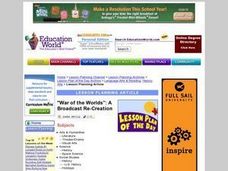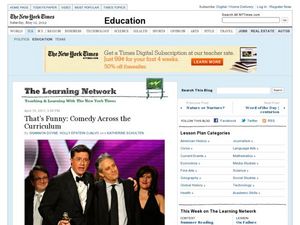Curated OER
Fighting Fake News
Fake news. Alternative facts. Internet trolls. In an age of Newspeak, it's increasingly important to equip 21st century learners with the skills needed to determine the legitimacy of claims put forth on social media, in print, and in...
Facing History and Ourselves
The Importance of a Free Press
"Congress shall make no law . . . abridging the freedom of speech, or of the press;. . ." Why is this guarantee of free speech and a free press the First Amendment to the US Constitution? Why are these rights so essential to a democracy?...
Facing History and Ourselves
Citizen Watchdogs and the News
To conclude their case study of media coverage of the shooting of Michael Brown by a Ferguson, Missouri, police officer, class members consider the role of citizen watchdogs in a democratic society, develop strategies for combating...
Newseum
Free Press Challenges Through History: Analyzing Historical Sources
The debate over the integrity of stories in media is not new. Young journalists analyze historical sources that reveal freedom of the press controversies and draw parallels to challenges freedom of the press faces today.
Facing History and Ourselves
Social Media and Ferguson
How can social media help or hinder civil dialogue? How can information shared on social media be verified? As the investigation of media reports of the events surrounding the shooting of Michael Brown continues, class members read news...
Facing History and Ourselves
Verifying Breaking News
The attempts of journalists to verify the events surrounding the shooting of Michael Brown take center stage as individuals analyze three of the initial newspaper accounts of the story. The whole class discussion then focuses on the...
Newseum
Bias Through History: Analyzing Historical Sources
Young journalists use the E.S.C.A.P.E. (evidence, source, context, audience, purpose, and execution) strategy to evaluate historical and contemporary examples of bias in the news. The class then uses the provided discussion questions to...
Facing History and Ourselves
#IfTheyGunnedMeDown
As part of their continued investigation of the reporting of the shooting of Michael Brown class members analyze photos of Michael Brown and the social media response to these images. The class then develops a guide they believe news...
Media Smarts
The Citizen Reporter
Ripped from the headlines! Discuss topical social issues like racism, discrimination, and diversity while exploring the concept of citizen journalism. Begin with a professional-looking presentation on the history of citizen journalism....
Curated OER
"War of the Worlds": A Broadcast Re-Creation
Why did Orson Welles' 1938 Broadcast of a adaptation of H.G. Wells' The War of the Worlds cause such a panic? To answer this question, class members listen to the original broadcast and research the panic that resulted. They then engage...
Facing History and Ourselves
The Power of Images
One picture but a thousand stories. As a part of a case study of how the death of Michael Brown was reported by professional news sources and on social media class members examine the reactions of various groups to a photograph taken by...
Curated OER
Ancient Cultures News Broadcast
How does geography influence daily life? Guided by an essential question, class groups select and then research an ancient culture, and develop a news broadcast about the geographical setting and its impact on the culture. Teams select...
Curated OER
Walter Cronkite: Witness to History
Students brainstorm a list of news sources. They interview people about today's media and discuss their results. After watching segments of a film about Walter Cronkite, they role play as reporters and subjects from an historic period...
Curated OER
Comedy Across the Curriculum
The New York Times Learning Network provides the resources that permit pupils to examine and then write and perform a fake news broadcast in the vein of “The Daily Show” or “Saturday Night Live” Weekend Update. The generated reports...
Facing History and Ourselves
Hands Up, Don't Shoot!
Why is it so difficult to develop a clear understanding of the events surrounding the shooting of Michael Brown by a Ferguson, Missouri, police officer? To answer this question class members listen to a NPR discussion of the findings of...
Curated OER
The Student Cafateria as the "Leafy Chestnut Tree"
High schoolers examine the difference between "news" of earlier periods, and "news" as we know it today. They then go out into the school common areas and analyze news from the perspective of word-of-mouth storys and discuss what they...
Curated OER
Immigration Debate
Students investigate the law recently passed in Arizona, "Support our Law Enforcement and Safe Neighborhoods Act." In this history lesson, students watch a video on immigration then work in small groups to prepare a debate on the pros...
Curated OER
Democracy Sense
Students define democracy and distinguish representative from direct or pure democracy. Then, with the focus on representative government, students will discuss and trace voting patterns in the United States.
Curated OER
Radio Program
Students identify and assess the impact of unions on workers, management, and community. They listen to radio stories, students are asked what can they conclude about the impact of unions on the lives of the workers, management, and...




















